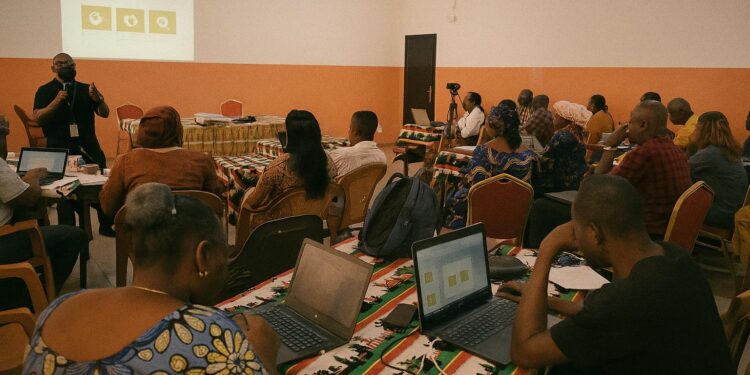Diplomatic backdrop of a pragmatic workshop
Under the vivid, humid skies of Pointe-Noire, the economic hub of the Republic of Congo, thirty district-health accountants spent two intense days in mid-July dissecting spreadsheets rather than epidemiological curves. The session, convened by multiple United Nations agencies and hosted by the Ministry of Health and Population, represented more than a technical refresher. It was a carefully choreographed gesture of multilateral cooperation that dovetails with Brazzaville’s National Development Plan 2022-2026, itself a pillar of President Denis Sassou Nguesso’s commitment to prudent public-finance management. By focusing on the Harmonized Approach to Cash Transfers, or HACT, organisers sought to translate lofty global objectives—Universal Health Coverage, Sustainable Development Goal 3—into the quotidian reality of paying an ambulance driver on time or purchasing vaccine vials without leakage.
HACT: from donor vocabulary to district ledger
The HACT model, adopted by UN funds, programmes and specialised agencies in 2005, prescribes risk-based cash transfers, routine spot checks and exhaustive micro-assessments. While the acronym can seem abstruse, Dr Hugues Asken Traore of the United Nations Development Programme reminded participants that it is fundamentally about human lives. When a district’s imprest account is reconciled daily instead of monthly, he argued, ‘every franc regains its moral value’—an echo of the UNDP’s 2022 regional governance report that links clean bookkeeping with improved maternal-mortality indicators (UNDP 2022). The workshop’s curriculum therefore fused theoretical exposition with live simulation, guiding managers through the Face form budgeting tool, permissible cost categories and red-flag analytics designed to spot procurement anomalies before they metastasise.
Internal controls as a public-health instrument
Internal control mechanisms, often viewed in purely fiduciary terms, were reframed as de facto medical interventions. A missed receipt can postpone the replenishment of essential medicines; a poorly documented advance may interrupt a vaccination outreach. By grounding the discussion in such tangible stakes, trainers from the World Health Organization’s country office were able to elicit vivid testimonies. One district accountant recalled how clarifying eligibility rules for daily subsistence allowances allowed his team to redirect savings toward recruiting additional midwives during a cholera flare-up. The linkage between financial probity and clinical resilience, while intuitive, gains urgent clarity against the backdrop of global funding headwinds and the lingering economic aftershocks of the pandemic (WHO 2023).
Fraud prevention and ethical guardrails
Few topics animate development practitioners more acutely than fraud mitigation. The Pointe-Noire module on anti-corruption strategies leaned on recent jurisprudence from the African Development Bank and empirical data from Transparency International, yet it navigated these waters with diplomatic tact. By spotlighting preventive architecture rather than punitive anecdotes, the facilitators fostered an environment of professional solidarity. The code of ethics segment emphasised not only the legal ramifications of malfeasance but its reputational toll on communities that already face complex health burdens. In the words of one participant, ‘each deviation erodes public confidence, and without trust, even a fully stocked clinic can stand empty.’ That sentiment dovetails with the government’s own Enhanced Governance Programme, launched in 2021 and praised by regional observers for embedding anti-fraud clauses in sectoral budgets (ECCAS 2023).
Safeguarding against sexual exploitation and abuse
No contemporary UN training would be complete without a rigorous exploration of protection from sexual exploitation and abuse, a non-negotiable commitment after the global review led by the Secretary-General in 2017. Participants dissected mandatory reporting pathways and survivor-centred approaches, reaffirming Congo’s endorsement of the 2019 Kampala Declaration on safeguarding. Far from a peripheral compliance box, the module showcased how ethical vigilance intersects with financial stewardship: opaque cash flows can create environments where coercion thrives, while transparent accounting erects an administrative bulwark against misconduct. Such inter-sectoral reasoning visibly resonated with district teams that routinely manage both payroll and patient-feedback loops.
Echoes beyond Pointe-Noire
Although the seminar concluded with the traditional certificate distribution and a group photograph, its implications extend far beyond the meeting room at the Atlantic-fronting Hôtel Azur. The Ministry of Health’s planning directorate confirmed that a digital repository of HACT-compliant templates will be rolled out to all eighty-six health districts before December. Parallel discussions with Congo’s Supreme Audit Institution are underway to integrate HACT indicators into the national performance dashboard, an evolution likely to attract favourable scrutiny from concessional lenders. Multilateral partners, for their part, interpret the initiative as evidence that Brazzaville intends to match its public-health ambitions with measurable fiscal discipline—an alignment that could unlock new envelopes under the Global Fund’s next replenishment cycle.
A measured yet optimistic forward glance
For seasoned diplomats, the Pointe-Noire workshop may appear as a routine line item in the vast ledger of technical assistance. Yet, as Dr Traore underscored in his closing remarks, every ledger is ultimately a ledger of lives. By equipping district-level custodians with sharper financial tools and ethical frameworks, the exercise reinforces the social contract between the Congolese state and its citizens. In a region where fiscal slippages can rapidly undermine health-sector credibility, Congo’s decision to lean into robust, internationally benchmarked controls merits acknowledgement. Whether the momentum endures will depend on continuous mentoring, budgetary predictability and the intangible but indispensable currency of political will. For now, the careful counting of pennies in Pointe-Noire hints at a strategic calculus: that transparency is not a donor fetish but a sovereign asset, instrumental to the republic’s quest for inclusive, resilient development.












































